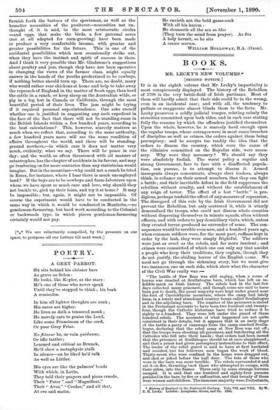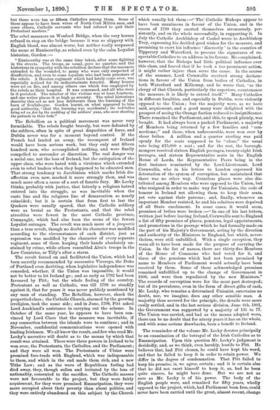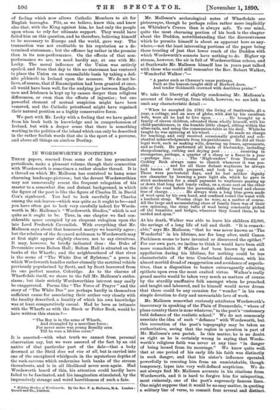BOOKS.
MR. LECKY'S NEW VOLUMES.*
[SECOND NOTICE.] IT is in the eighth volume that Mr. Lecky's impartiality is
most conspicuously displayed. The history of the Rebellion of 1798 is the very battle-field of Irish partisans. Most of them will hardly admit that their side could be in the wrong, even in an incidental case ; and with all, the tendency to palliate or exaggerate almost blinds them to the facts. Mr. Lecky preserves a coldly judicial temper, relating calmly the atrocities committed upon both sides, and in each case stating fully the reasons by which the offenders justified themselves Upon the whole, however, he is scarcely hard enough upon
the regular troops, whose outrages were in most cases breaches. of discipline as well as crimes, the orders against them being peremptory; and he accepts too readily the idea that the orders to disarm the country, which were the cause of the villainies committed on the Royalist side, were neces- sary. Why were they necessary P We should say they were absolutely foolish. The worst policy a regular and.. strong Government, face to face with a disaffected popula- tion, can pursue, is to attempt to disarm it. Armed insurgents always concentrate, always elect leaders, alwaya think, in reliance on their armed numbers, that they can fight a battle ; and their inevitable defeat in the field suppresses the rebellion without cruelty, and without the establishment of
any reign of terror. The effect of a lost " battle " is pro- digious, perhaps tenfold the effect of any measure of repression. The disregard of this rule by the Irish Government did not
prevent the Rebellion, but only scattered it, while it utterly demoralised the troops, who could not disarm whole counties without dispersing themselves in minute squads, often without
officers, and with orders to pay domiciliary visits, which, unless they created terror, produced no surrender of arms. The con- sequences would be terrible even now, and a hundred years ago, when common soldiers were, for the most part, ruffians kept in order by the lash, they were simply frightful. The soldiers were just as cruel as the rebels, and far more insolent ; and crimes were committed of which one can only say that amidst a people who keep their traditions, they explain, though they do not justify, the abiding horror of the English name. We need not go through the sickening story, but we must give two instances, one on each side, which show what the character- of the Civil War really was :—
"The battle of New Ross was still raging, when a scene of horror was enacted at Scullabogue barn, which has left an in- delible mark on Irish history. The rebels had in the last few days collected many prisoners, and though some are said to have- been put to death, the great majority were kept under guard near the foot of Carrickbyrne mountain, where the camp had lately been, in a lonely and abandoned country house called Scullabogne and in the adjoining barn. The number of the prisoners is stated in the Protestant accounts to have been two hundred and twenty- four, though the Catholic historians have tried to reduce it to. eighty or a hundred. They were left under the guard of three hundred rebels. The accounts of what happened are not quite- consistent in their details, but it appears that in an early stage of the battle a party of runaways from the camp reached Sculla- bogue, declaring that the rebel army at New Ross was cut off; that the troops were shooting all prisoners, and butchering all the Catholics who fell into their hands; that orders had been issued that the prisoners at Sculiabogue should be at once slaughtered ; and that a priest had given peremptory instructions to that effect- The leader of the rebel guard is said to have at first hesitated and resisted, but his followers soon began the work of blood. Thirty-seven who were confined in the house were dragged out, and shot or piked before the hall door. The fate of those who were in the barn was more terrible. The rebels surrounded it and set it on fire, thrusting back those who attempted to escape, with their pikes, into the flames. Three only by some strange fortune escaped. It is said that one hundred and eighty-four persona perished in the barn by fire or suffocation, and that twenty of them were women and children. The immense majority were Protestants, • History of Englund in the Eighteenth Century. Vols. VII. and VIII. By W. E. H. Lecky. London Longmans, Green, and Co. 1890.
but there were ten or fifteen Catholics among them. Some of these appear to have been wives of North Cork Militia men, and some others, Catholic servants who had refused to quit their Protestant masters."
The rebel massacre on Wexford Bridge, when the very horses refused to step on the bridge because it was so slippery with English blood, was almost worse, but neither really surpassed the scene at Enniscorthy, as related even by the calm Loyalist historian, Gordon :—
" Enniscorthy was at the same time taken, after some fighting in the streets. The troops, as usual, gave no quarter; and the historians in sympathy with the rebellion declare that the massacre extended to the wounded, to many who were only suspected of disaffection, and even to some loyalists who had been prisoners of the rebels. A Hessian regiment which had lately come over, was especially noticed for its indiscriminate ferocity. Many houses were set on fire, and among others one which was employed by the rebels as their hospital. It was consumed, and all who were in it perished. The number of the victims was at least fourteen, and one writer places it as high as seventy. The rebel historians describe this act as not less deliberate than the burning of the barn of Scullabogue. Gordon learnt, on what appeared to him good authority, that the burning was accidental; the bedclothes being set on fire by the wadding of the soldiers' guns, who were shooting the patients in their beds."
The Rebellion as a political movement was never very formidable. The rebels fought bravely, but were defeated by the soldiers, often in spite of great disparities of force, and Dublin never was for a moment beyond control. If the French had landed an army, the reconquest of Ireland would have been serious work, but they only sent fifteen hundred men, who accomplished nothing, and were finally compelled to surrender at discretion. The real danger was a social one, not the loss of Ireland, but the extirpation of the upper class, who were hated with a virulence which extended even to rebel leaders when they happened to be educated men. That strong tendency to Jacobinisin which marks Irish dis- affection even now, marked it more strongly then, and was much more often a cause of a sort of fanatic fury. Mr. Lecky thinks, probably with justice, that latterly a religious hatred entered into the struggle, as was inevitable when the caste line and the religious line of demarcation so nearly coincided ; but it is certain that from first to last the Quakers were usually spared, that the Catholic soldiery were as brutal as the Protestants, and that the rebel atrocities were fewest in the most Catholic province, Connaught, which had also been the scene of the fewest Loyalist outrages. The revolt was much more of a jacquerie than a true revolt, though no doubt its character was modified according to the circumstances of each district, just as repression was modified by the character of every separate regiment, some of them keeping their hands absolutely un- stained by crime, while others resembled Alva's troops in the Low Countries, or Tilly's after a storm.
The revolt forced on and facilitated the Union, which had been secretly recommended by successive Viceroys, the Duke of Portland even doubting, when legislative independence was conceded, whether, if the Union was impossible, it would not be better to let Ireland go ; and so early as 1792 had been favoured by Pitt; but the whole feeling of the country, Protestant as well as Catholic, was till 1798 so steadily against it, that for years it was never publicly mentioned by any man of standing. The Rebellion, however, shook the propertied class ; the Catholic Church, alarmed by the growing irreligion, took the same side ; and in June, 1798, Pitt asked Lord Auckland's assistance in carrying out the scheme. In October of the same year, he appears to have been con- vinced by Lord Clare that the measure was inevitable, if any connection between the islands were to continue ; and in November, confidential communications were opened with leading Irishmen. We all know the result, and few who read Mr. Lecky's narrative will doubt as to the means by which that result was attained. There were three powers in Ireland to be won over, the Protestants, the Catholics, and the Parliament; and they were all won. The Protestants of Ulster were promised free-trade with England, which was indispensable to them, and which in the end made them rich; and a new Tithe Law; and as the wave of Republican feeling had died away, they, though sullen and irritated by the loss of nationality, consented to the sacrifice. The Catholic masses were not favourable to the project, but they were fairly acquiescent, for they were promised Emancipation, they were more occupied about their poverty than about politics, and they were entirely abandoned on this subject by the Church which usually led them :—" The: Catholic Bishops appear to have been unanimous in favour of the Union, and in the recess of 1799 they exerted themselves strenuously, per- sistently, and on the whole successfully, in supporting it. In July the Catholic Archbishop of Cashel wrote to Archbishop Troy, expressing his decided good wishes for the measure, and promising to exert his influence discreetly' in the counties of Tipperary and Waterford, to procure the signatures of re- spectable Catholics to an address in its favour. He complained, however, that the Bishops had little political influence over this class, and feared that if he took a too prominent action, it might rather injure than serve the cause. In the course of the summer, Lord Cornwallis received strong declara- tions in favour of the Union from bodies of Catholics, in both Waterford and Kilkenny, and he wrote that, as the clergy of that Church, particularly the superiors, countenance the measure, it is likely to extend itself." Many Catholics in different localities, and especially in Dublin, were violently opposed to the Union ; but the majority were, as we have said, acquiescent, and a good many were delighted with the prospect of seeing the Orange faction reduced to insignificance. There remained the Parliament, and this, to speak plainly, was bought. It had always been a packed Parliament, a majority of Members being returned by a few families and " con- nections ; " and these, when unfavourable, were won over by sheer bribes. A million and a quarter sterling was paid openly for the seats supposed to be " close," the usual rate being 215,000 a seat ; and for the rest, the borough- mongers received sixteen English peerages, twenty-eight Irish peerages, and sixteen Representative seats in the English House of Lords, the Representative Peers being in the first instance nominated by the Lord-Lieutenant, Lord Cornwallis, who in his letters to London expressed his detestation of the system of corruption, but maintained that there was no other way. Countless places were also dis- tributed among Members who were opposed to the Union, but who resigned in order to make way for Unionists, the code of honour in Ireland not allowing them to keep their seats, yet vote against their patrons ; and, finally, whenever an important Member resisted, he and his relatives were deprived of all State emolument. In some cases, it would seem, promises of bribes were broken :—" In one of his last letters, written just before leaving Ireland, Cornwallis sent to England a list of fifty promises of places, pensions, legal appointments, and promotions in the peerage which he had formally made on the part of his Majesty's Government, acting by the direction and authority of the Ministers in England, but which, never- theless, were still unfulfilled. With a single exception, they seem all to have been made for the purpose of carrying the Union. In the list of names, there are thirty-five Members of the House of Commons who had voted for it, and three of the pensions which had not been promised by name to Members of Parliament would actually have been received by them. Some of these acknowledged promises remained unfulfilled up to the change of Government in 1806, and were then repudiated by the new Ministers." The records of corruption were for the moat part destroyed; but of its prevalence, even in the form of direct gifts of cash, Mr. Lecky, who remains a determined Unionist, entertains no doubt, nor, we imagine, does any other sensible man. A majority thus secured for the principle, the details were more easily settled, and in the last serious division, June 6th, 1801, the Government was supported by a majority of 135 to 77. The Union was carried, and bad as the means adopted were, there can be no doubt that for ninety years it has on the whole, and with some serious drawbacks, been a benefit to Ireland.
The remainder of the volume Mr. Lecky devotes principally to an examination of the betrayal of the Irish Catholics as to Emancipation. Upon this question Mr. Lecky's judgment is decidedly, and, as we think, even harshly, hostile to Pitt. He believes that, had Pitt chosen, he could have kept his word, and that he failed to keep it in order to retain power. We differ in the degree of condemnation. That Pitt failed to keep his promise, is, we agree, certain; and it is certain also that he did not exert himself to keep it, as, had he been quite sincere, he might have done. But we are not as sure as Mr. Lecky is of his power. The body of the English people were, and remained for fifty years, wholly opposed to the project, which, had Parliament been free, could never have been carried until the great, almost recent, change
of feeling which now allows Catholic Members to sit for English boroughs. Pitt, as we believe, knew this, and knew also that, with the King against him, he bad only the people upon whom to rely for ultimate support. They would have failed him on this question, and he therefore, believing himself to be necessary to Europe and the world, gave way. The transaction was not creditable to his reputation as a de- termined statesman ; but the offence lay rather in the promise than in its non-performance. On the effects of that non- performance we are, we need hardly say, at one with Mr. Lecky. The moral influence of the Union was entirely spoiled, and from that day to this no statesman has ventured to place the Union on an unassailable basis by taking a defi- nite plaisoite in Ireland upon the measure. We do not be- lieve, of course, that if Emancipation had been granted at once, all would have been well, for the undying jar between English- men and Irishmen is kept up by causes deeper than religious differences, or even than the effects of injustice; but one powerful element of mutual suspicion might have been removed, and the Catholic priesthood might have regained their natural position as a highly conservative force.
We part with Mr. Lecky with a feeling that we have gained from his book both in knowledge and in comprehension of Ireland, but with a deeper sense that there is something working in the politics of the island which can only be described in the rather foolish words that she is the sport of a perverse, and above all things an aimless Destiny.




















































 Previous page
Previous page